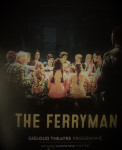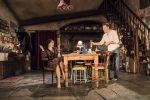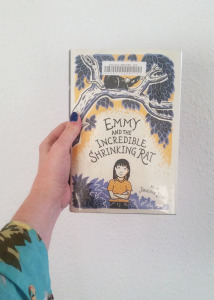 The third of our theatrical treats between Christmas and the New Year was this extraordinary production of Jez Butterworth’s The Ferryman, which had transferred from the Royal Court earlier in the year for a limited period. Such is the demand for seats that the production has already been extended twice. If you go to see this hoping to discover exactly why you shouldn’t pay the ferryman until he gets Chris de Burgh to the other side, you might be sadly disappointed. What you will get, however, is a sizzling and thrilling story set in Northern Ireland in 1981 that shows how the sectarian divide affected one particular extended family.
The third of our theatrical treats between Christmas and the New Year was this extraordinary production of Jez Butterworth’s The Ferryman, which had transferred from the Royal Court earlier in the year for a limited period. Such is the demand for seats that the production has already been extended twice. If you go to see this hoping to discover exactly why you shouldn’t pay the ferryman until he gets Chris de Burgh to the other side, you might be sadly disappointed. What you will get, however, is a sizzling and thrilling story set in Northern Ireland in 1981 that shows how the sectarian divide affected one particular extended family.
 Nine years before, Seamus Carney went missing, leaving behind his wife Caitlin and three-year-old son Oisin. Word was that he had got on a ferry to Liverpool, but had never kept in contact with his family. The wife and son moved in with Seamus’ brother Quinn and his wife Mary, who lived in a farm in County Armagh with their several children, aged relatives, and miscellaneous livestock. Whilst they never forgot their missing husband and father, they did their best to get on with their lives. Until one day, local priest Father Horrigan is mysteriously called to Derry where he discovers that a body has been found… He knows it is undeniably Seamus but why did he meet his death, and who is this mysterious Mr Muldoon who gains both fear and respect in equal measure? The play sets itself up to be a full-throttle thriller, part whodunit, part whydunit; however, when Father Horrigan returns to Armagh to break the news to the Carney family we realise the significance of the death will be much greater than first thought.
Nine years before, Seamus Carney went missing, leaving behind his wife Caitlin and three-year-old son Oisin. Word was that he had got on a ferry to Liverpool, but had never kept in contact with his family. The wife and son moved in with Seamus’ brother Quinn and his wife Mary, who lived in a farm in County Armagh with their several children, aged relatives, and miscellaneous livestock. Whilst they never forgot their missing husband and father, they did their best to get on with their lives. Until one day, local priest Father Horrigan is mysteriously called to Derry where he discovers that a body has been found… He knows it is undeniably Seamus but why did he meet his death, and who is this mysterious Mr Muldoon who gains both fear and respect in equal measure? The play sets itself up to be a full-throttle thriller, part whodunit, part whydunit; however, when Father Horrigan returns to Armagh to break the news to the Carney family we realise the significance of the death will be much greater than first thought.
 Jez Butterworth has created a stunningly written play about a complex family environment which Sam Mendes’ production brings to life with more depth and insight than you could imagine. The huge farmhouse kitchen extends deep into the back of the Gielgud stage; the tall, steep staircase from above disgorges more family members than you could predict down to the big table that is the focal point for the family’s activities. In one corner sits an old aunt, most of the time her mind locked in a dementia-filled prison, occasionally returning to life to amuse the children with stories of old. Opposite her sits another aunt, chain-smoking, her attention captured by the radio news and the speech of Prime Minister Thatcher talking about the IRA hunger strikers. Between them the stage is filled with children of all ages, both Carneys and their cousins the Corcorans, some of them idealists, some realists, but none of them without an opinion. Neighbour Tom Kettle drops by with apples for the children, and maybe a rabbit in his deep pockets; a simple soul but with the strength of two men, as becomes apparent as the story develops. There’s always so much going on for the audience to observe that the play constantly keeps you on your toes, despite its long length of three hours and ten minutes – at least. All human life is there, as the News of the World once boasted.
Jez Butterworth has created a stunningly written play about a complex family environment which Sam Mendes’ production brings to life with more depth and insight than you could imagine. The huge farmhouse kitchen extends deep into the back of the Gielgud stage; the tall, steep staircase from above disgorges more family members than you could predict down to the big table that is the focal point for the family’s activities. In one corner sits an old aunt, most of the time her mind locked in a dementia-filled prison, occasionally returning to life to amuse the children with stories of old. Opposite her sits another aunt, chain-smoking, her attention captured by the radio news and the speech of Prime Minister Thatcher talking about the IRA hunger strikers. Between them the stage is filled with children of all ages, both Carneys and their cousins the Corcorans, some of them idealists, some realists, but none of them without an opinion. Neighbour Tom Kettle drops by with apples for the children, and maybe a rabbit in his deep pockets; a simple soul but with the strength of two men, as becomes apparent as the story develops. There’s always so much going on for the audience to observe that the play constantly keeps you on your toes, despite its long length of three hours and ten minutes – at least. All human life is there, as the News of the World once boasted.
 If you remember the Northern Ireland troubles, as they are euphemistically referred to, that period of total distrust and thinly veiled enmity which we hope and pray will never return, you’ll probably have a sense of who were the good guys and who were the bad guys. This play will challenge those preconceptions, and make you reappraise both sides of the gulf. Few of us are all good or all bad. And who knows what someone is capable of if their homeland, or their family, or anything they hold dear are directly threatened. The play has a surprise, shocking ending that I certainly could not see coming and you’ll be applauding the curtain call with your heart in your mouth.
If you remember the Northern Ireland troubles, as they are euphemistically referred to, that period of total distrust and thinly veiled enmity which we hope and pray will never return, you’ll probably have a sense of who were the good guys and who were the bad guys. This play will challenge those preconceptions, and make you reappraise both sides of the gulf. Few of us are all good or all bad. And who knows what someone is capable of if their homeland, or their family, or anything they hold dear are directly threatened. The play has a surprise, shocking ending that I certainly could not see coming and you’ll be applauding the curtain call with your heart in your mouth.
 The performance we saw, gentle reader, which was the matinee on Thursday 28th December, had a drama all of its own. On arrival we were informed that there would be two cast changes, and that chain-smoking, IRA supporting Aunt Pat would be played by Mary Keegan and that Seamus’ son Oisin would be played by Conor Gormally. All well and good, and I thought Ms Keegan in particular was stonkingly effeective as the difficult old cow, picking fights with anyone who’ll stop still, insinuating scandal and discontent within the household – a memorable and powerful performance. Then came the interval, which was scheduled for fifteen minutes. After about twenty-seven minutes, the stage manager appeared and apologised for the delay but explained that Will Houston, who was playing Quinn Carney, had been taken ill and his role would be continued by Dean Ashton. I thought Mr Houston was giving a tremendous performance as Quinn, a superb portrayal of a man who has to wear many hats – father, husband, brother in law; provider, stabiliser, role model. So I was very surprised to see that he couldn’t continue. It must be very difficult to come on during a show and assume a role that the audience has already attributed to a different actor, but Mr Ashton did a grand job, although I felt his characterisation of Quinn was a little more reserved than Mr Houston’s.
The performance we saw, gentle reader, which was the matinee on Thursday 28th December, had a drama all of its own. On arrival we were informed that there would be two cast changes, and that chain-smoking, IRA supporting Aunt Pat would be played by Mary Keegan and that Seamus’ son Oisin would be played by Conor Gormally. All well and good, and I thought Ms Keegan in particular was stonkingly effeective as the difficult old cow, picking fights with anyone who’ll stop still, insinuating scandal and discontent within the household – a memorable and powerful performance. Then came the interval, which was scheduled for fifteen minutes. After about twenty-seven minutes, the stage manager appeared and apologised for the delay but explained that Will Houston, who was playing Quinn Carney, had been taken ill and his role would be continued by Dean Ashton. I thought Mr Houston was giving a tremendous performance as Quinn, a superb portrayal of a man who has to wear many hats – father, husband, brother in law; provider, stabiliser, role model. So I was very surprised to see that he couldn’t continue. It must be very difficult to come on during a show and assume a role that the audience has already attributed to a different actor, but Mr Ashton did a grand job, although I felt his characterisation of Quinn was a little more reserved than Mr Houston’s.
 Then there was what the programme describes as a “brief pause” between the second and third act, with the ushers asking us to stay in our seats as it was only about a two-minute break. After about ten minutes, the stage manager reappeared, like a valued old friend popping in to see if we were doing alright. Apologies again, but this time one of the child actors had been taken ill, so Master Thomas Harrison, who had been playing Declan Corcoran, would be replaced by Master Jack Nuttall and he was quickly getting his costume on. What on earth was going on back there? They were dropping like flies. Young Mr Nuttall was superb by the way; he had a number of quite complex – and comic – speeches early in the third act and he carried it all off brilliantly. But never before had a cast looked quite so relieved at curtain call to have actually made it to the end, nor had an audience been so grateful for the presence of the safety curtain to keep whatever lurgy was running riot away from us!
Then there was what the programme describes as a “brief pause” between the second and third act, with the ushers asking us to stay in our seats as it was only about a two-minute break. After about ten minutes, the stage manager reappeared, like a valued old friend popping in to see if we were doing alright. Apologies again, but this time one of the child actors had been taken ill, so Master Thomas Harrison, who had been playing Declan Corcoran, would be replaced by Master Jack Nuttall and he was quickly getting his costume on. What on earth was going on back there? They were dropping like flies. Young Mr Nuttall was superb by the way; he had a number of quite complex – and comic – speeches early in the third act and he carried it all off brilliantly. But never before had a cast looked quite so relieved at curtain call to have actually made it to the end, nor had an audience been so grateful for the presence of the safety curtain to keep whatever lurgy was running riot away from us!
 The production was notable for some other excellent performances; Sarah Greene was superb as the widowed Caitlin, enjoying what comfort she could from her close relationship with her brother in law, feisty when defending herself but dignified when she knows she cannot beat the system. Charles Dale was also excellent as Father Horrigan, desperately trying to provide as much support as he can whilst knowing that he too is beaten and could easily make things worse. Laurie Davidson gives a great performance as the progressively drunk and indiscreet Shane Corcoran, and Ivan Kaye is a disarmingly kind Tom Kettle, his seething pile of emotions never too far from the surface. There’s also a terrific performance from Stuart Graham as the quietly calculating and intimidating Muldoon. But this is a true ensemble piece, and the understanding between all the cast members, young and old, is a total joy to watch. I can’t recommend it too highly. As of today, 8th January 2018, a brand new cast is taking over until May.
The production was notable for some other excellent performances; Sarah Greene was superb as the widowed Caitlin, enjoying what comfort she could from her close relationship with her brother in law, feisty when defending herself but dignified when she knows she cannot beat the system. Charles Dale was also excellent as Father Horrigan, desperately trying to provide as much support as he can whilst knowing that he too is beaten and could easily make things worse. Laurie Davidson gives a great performance as the progressively drunk and indiscreet Shane Corcoran, and Ivan Kaye is a disarmingly kind Tom Kettle, his seething pile of emotions never too far from the surface. There’s also a terrific performance from Stuart Graham as the quietly calculating and intimidating Muldoon. But this is a true ensemble piece, and the understanding between all the cast members, young and old, is a total joy to watch. I can’t recommend it too highly. As of today, 8th January 2018, a brand new cast is taking over until May.
P. S. When it comes to this year’s theatrical awards, this production is a shoe-in for Best Fowl in a Supporting Role.
Production photos by Johan Persson
Like this:Like Loading... Related




